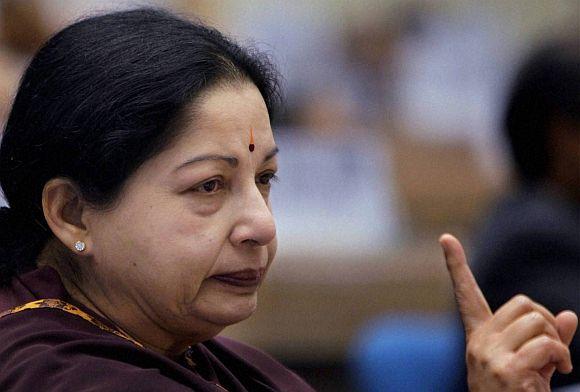
Women party workers took out traditional "milk pot spiritual procession" in many places, lamps were lighted in temples and coconuts offered as part of prayers "for the return of Jayalalithaa as chief minister".
Echoing similar sentiment and targeting arch rival Dravida Munnetra Kazhagam, AIADMK mouthpiece "Dr Namadhu MGR" on Sunday said "the time for our Puratchi Thai (Revolutionary Mother) to sit on the chariot of governance is coming in Chennai on Monday. Till then, little foxes may howl."
Over 6,000 AIADMK women party in Tiruvarur carried milk pots on their heads and went in a procession which culminated at the ancient Thiagaraja Swamy temple where prayer sessions were held. Also, at the Palani Dhandayuthapani Swami hill temple, a padyatra with "1,006 theertha pots" was held.
In Tiruvannamalai district's Raattinamangalam village, 507 women cadres took out a milk pot procession to the GangaiammanTemple.
In Karur, 1,00,008 earthen lamps were lit forming the words "Amma" in the sprawling Sri Kalyanana Pasupatheeshwara temple and a 'Mahayagna' is being held which is led by Sivacharyas (priests).
At the MaduraiMeenakshiTemple, 1,008 coconuts were broken in front of the sanctum sanctorum of "Mahamaha Muneeshwara," the guardian, protective deity.
Similar prayers and special yagnas like a "Chatru Samhara Yagna," are being held across the state where Annadhanam (community lunch) is also being provided for the people.
Meanwhile, police in Salem said strict vigil is being maintained on the Tamil Nadu-Karnataka border, especially in the Hosur area.
The Karnataka High Court is set to give its verdict on Monday on appeals filed by Jayalalithaa and three others against the Special Court Judge Michael D'Cunha's September 27 last verdict sentencing them to four years in jail and imposing a fine of Rs 100 crore on her and Rs 10 crore each on the others.
Jayalalithaa, 67, had resigned as Tamil Nadu chief minster following her conviction.
After meandering for 18 years, the case had reached the climax with the conviction in September last year that brought her down from the pedestal of chief ministership and unseated her from the assembly.
She has earned the dubious distinction of losing the chief minister's post twice following conviction in graft cases -- in 2001 and 2014.
Jayalalithaa had been charged with accumulating Rs 66.65 crore wealth disproportionate to known sources of her income from 1991-96 in her first term as chief minister in the case that has seen many political and legal twists and turns.
Her close aide Sasikala Natarajan, her niece Ilavarasi and her nephew and Jayalalithaa's disowned foster son Sudhakaran were held guilty by the trial court.
In perhaps one of the longest legal battles involving a political leader ever since the case was filed, the country has witnessed five Lok Sabha elections and Tamil Nadu three Assembly polls.
Controversy also swirled around the case after Karnataka Advocate General B V Acharya quit as Special Public Prosecutor and Bhavani Singh came in his place in the trial court.
Singh continued as SPP in the High Court but the Supreme Court recently annulled his appointment as "bad in law", a verdict that brought back Acharya, who immediately filed a written submission seeking dismissal of the appeals by the AIADMK chief and three others.
The case was transferred to the Bangalore Special Court by the Supreme Court in 2003 on a plea by DMK, which claimed a fair trial cannot be held in Chennai as the Jayalalithaa-led AIADMK government was in power.